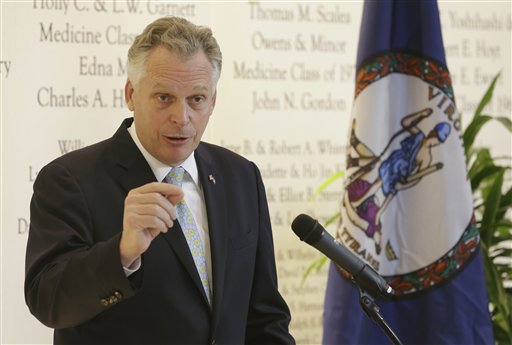(AP) Despite Dem wins, Va. still a two-party battle
By BILL BARROW
Associated Press
Terry McAuliffe’s inauguration as governor of Virginia on Saturday will highlight a notable Democratic winning streak in one of the nation’s most competitive states, but both Democrats and Republicans say the state remains a tossup going forward.
McAuliffe led a Democratic sweep of statewide offices in November with a close but convincing win over Attorney General Ken Cuccinelli. That came a year after President Barack Obama won the state for the second time, ending four decades of Virginia being a GOP lock in presidential contests. It’s also the first time in more than a generation that Democrats have followed a presidential win in the state with a victory in the gubernatorial election. The party holds both the state’s U.S. Senate seats, as well.
But Republicans are far from being out of power in Virginia. They control the state House and hold eight of the state’s 11 U.S. House seats. Two upcoming special elections will determine control of the state Senate. And McAuliffe won with just 47.8 percent of the vote _ 3 percentage points less Obama captured in 2012. His margin was dwarfed by outgoing Gov. Bob McDonnell’s 58.6 percent four years ago.
If anything, Republicans and Democrats agree, Virginia merely reflects the national political landscape: Democrats win in urban centers; Republicans claim most rural counties and small towns; and suburban voters tip the scales. Players on both sides insist the 2013 campaign offers ideas _ from grand strategy to the minute mechanics of identifying supporters and getting them to vote _ they can use again in Virginia and around the country in 2014 midterm elections.
Democrat Douglas Wilder, who became the nation’s first black to be elected governor in 1989, said the lesson is simple: “It’s not purple, it’s not blue, it’s not red,” he said, calling it instead “a people state.”
That’s a common explanation for McAuliffe’s victory over Cuccinelli, who forged his reputation as an outspoken opponent of abortion and same-sex marriage. Both Virginia parties have struggles among ideological purists and moderates. But as with national Republicans, control of the Virginia GOP tilts to staunch conservatives, mostly because the party selects nominees through conventions rather than primaries that attract more voters. Then in statewide elections, the more ideological and partisan candidates sometimes have a difficult time with that important suburban bloc.
Many partisans described both Cuccinelli and McAuliffe as flawed candidates _ Cuccinelli for his strident views, McAuliffe for his years as a ruthless political operative and fundraiser who ran the national Democratic Party for President Bill Clinton. But in last year’s campaign, McAuliffe was more effective at emphasizing jobs and the economy, while framing Cuccinelli as extreme.
McAuliffe’s campaign manager, Robby Mook, said his candidate “earned his stripes with voters … desperate for leaders who actually want to solve problems.” Cuccinelli, who topped a notably conservative slate of Republican statewide candidates, couldn’t separate himself “from a party whose agenda doesn’t suit the moderate, centrist middle of the state,” he said.
Mook acknowledges that Democrats’ have no built-in advantage that the right Republican candidate can’t overcome.
Republican National Committee aide Michael Short, who worked on the Cuccinelli campaign, said a socially conservative Republican can still connect with voters. The proof is McDonnell’s blowout win four years ago, Short said, combined with GOP legislative victories in suburban and exurban enclaves that Obama and McAuliffe both won. He also noted that Cuccinelli beat McAuliffe among the youngest voters.
Short and Mook said the state’s divided political loyalties makes campaign tactics all the more important. And both parties used the Virginia race to try and replicate the vaunted get-of-the-vote effort of Obama’s two presidential campaigns.
Essentially, Obama paired conventional tactics _ television, direct mail, phone calls and door-knocking _ with more widespread volunteer efforts and more sophisticated data analysis to reach supportive voters more efficiently. Campaigns use such data “micro-targeting” to decide everything from when and where to run television ads to where to send direct mail pieces.
Jesse Ferguson, an aide the Democratic National Committee’s congressional campaign office, said McAuliffe’s victory demonstrates that Obama’s campaign ideas “are replicable and scalable” for other races. But Mook cautioned that all campaigns turn first on the candidate and his or her broad appeal. Only then, he said, can tactics help decide a close race.
Ayers, the Republican pollster, agreed, saying that Republicans nationally will catch up with Democrats on tactics, but that in states like Virginia, they must first reassess the kind of candidates they put in front of voters.
___
Barrow reported from Atlanta. Associated Press writer Steve Szkotak in Richmond, Va., contributed to this report.
___
Follow Barrow on Twitter (at)BillBarrowAP.

COMMENTS
Please let us know if you're having issues with commenting.